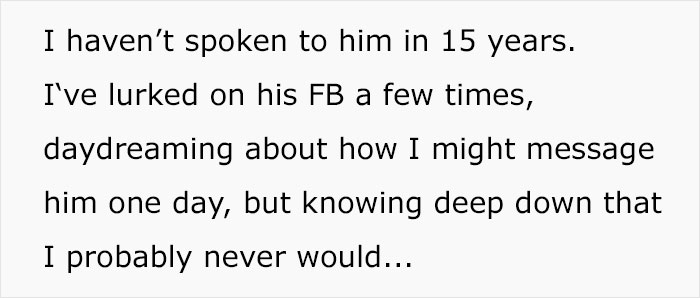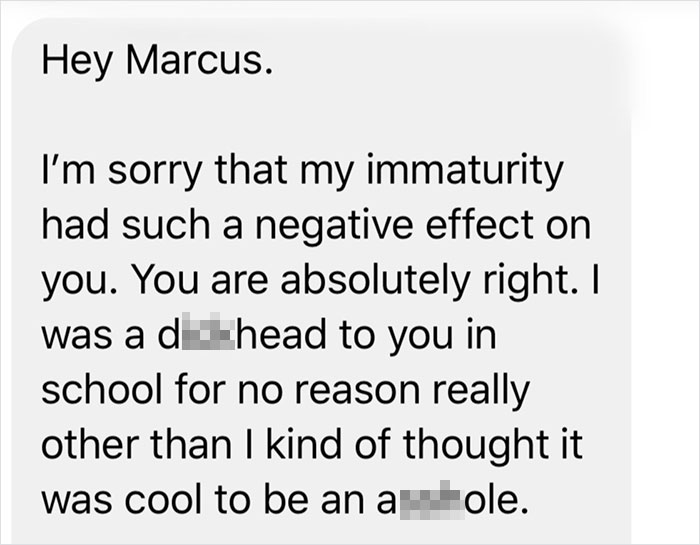
Guy Messages His Former Bully He Hasn’t Spoken To In 15 Years, Posts His Reply Online
Social psychologist Arie Kruglanski coined the phrase “need for closure” in the 1990s. It describes our desire for a firm answer to a question that will alleviate confusion and ambiguity.
When Marc. M contacted his middle school bully, he was probably seeking just that. Something that could explain why the guy picked him. YeahMarkYeah didn’t force him into a corner, demanding an apology or anything. He just told him how he felt about it.
However, the answer the former bully penned proved that kids grow up and people change, and you can’t be angry at someone forever. If they give you a reason.
Marc. M decided to face the painful feelings he had been carrying with himself for years and contacted his middle school bully
Image credits: YeahMarkYeah
The answer was so unexpected, Mark just had to share it online
Image credits: YeahMarkYeah
The need for closure doesn’t just apply to difficult relationships. The death of a close person, the loss of a job or social status are other examples of prolonged and painful endings. Letting go of something that’s important can be difficult, and many people seek closure when doing so.
Like The Conversation described it, it’s like putting together a mental puzzle of what’s happened – examining each piece and its relationship to the overall puzzle. Closure is achieved when we are satisfied that the puzzle has been assembled to our satisfaction, that the answers have been reached and it is therefore possible to move on.
People had a lot to say about their exchange
To those who think it's stupid to be bothered by this in adulthood, not all of us had families we could go home to & be comforted. Some people were bullied at home & at school. Some people already had mental issues that made it worse. It could make it a little harder to get over. I guess those people are of the "I'm fine so screw everyone else" mentality.
Yes, just because the abuse someone suffered in childhood came from other children doesn't mean it's not abuse and mental and physical abuse in childhood definitely has long lasting harmful effects on people.
Load More Replies...I contacted a woman and man whom I bullied and told them how very sorry I was. It was cathartic for me. I wish I had not done this and I wish the adults in my life had worked harder to prevent and or punish me for bully others. Please, please, please do all you can to keep your children from bullying others.
I bullied classmates on two occasions in early elementary school -- and I'm grateful that the teachers told me off. I got bullied in Grade One, too, but didn't tell anyone because first of all, I thought I deserved it; second, the teacher had told the class that you shouldn't tell on other kids. Looking back, I think, How convenient to teach a code of silence to little kids -- then you don't have to deal with bullying." Kudos to several of my teachers who were quite willing to confront bullies.
Load More Replies...My bully was in HS. He used to think it was hilarious to trashcan me. Well, it was until I pulled out a metal drawing compass and stabbed him in the thigh six times with the sharp point. He didn't trashcan me again. If anyone knows Rodney Bonner from Escondido, CA, tell him Devin sends his sharpest regards.
As a kid we had our merry band of misfits and didn't let anyone get bullied, we stuck together. As an adult one of my brothers married a very bullying wife, she has manipulated and bullied her way through our entire family, to the point, I am not sure how to deal with her anymore, she has this way of always making others feel sorry for her even though she is the one being so mean. The dynamics are different in this situation, lose my brother by having no contact or putting up with her mental illness, shes also a narcissist. I do think having dialog like this helps so many.
I highly recommend the book "Emotional Blackmail" by Susan Forward. One of her helpful acronyms is FOG: people do the bidding of a manipulator out of Fear, (feeling of) Obligation, or Guilt. Sometimes one has to respond in spite of those feelings in order to overcome manipulation. Anyways, find the book -- she also pinpoints tactics used by manipulators.
Load More Replies...I used to have a really good friend when i was in primary school (I think that's elementary? I'm not familiar with the American school system). I moved away for a few years then came back and she suddenly started bullying me HARD. Never knew why. One day on a school trip she randomly apologised to me and said she wanted to be friends again. I said yes..... then she went right back to bullying me. I've tried to friend her on facebook since then but she declined. I've always wondered what the bullying was about but I guess that's just one of lifes mysteries.
Can we stop with the ‘kids are jerks’. No, kids are not jerks. Jerks are jerks. Normal kids are not bullies. The fact these jerks are jerks is due to their parents and environment, not due to being a kid. Parents need to take their responsibility and teach their kids bullying is not ok, not normal.
I wonder if the horrible mean girl even knows anything she did/ said hurt people. I honestly don't think she is that self aware. She ended up having a kid who looks like the exact kind of kid she used to make fun of... wonder if she's learned anything.
I love this. I've always wanted to approach my old bully about this to get closure but people have told me to just get over it. I should, but I hate that it means people can just be horrible without any repercussions or apology.
Do it if you want, but be ready for your former bully to be in denial. If they do apologize, great. If not, you know that they were and will remain a terrible excuse for a human being. In that case, it can help to be grateful for what you have now. Build happy memories that you can pile on top of the bad ones.
Load More Replies...Are we gonna ignore that the thumbnail photo is basically clickbait? Nice job BP. But I'm glad the bully was able to grow up and apologize.
My first bully was a much taller and bigger boy in elementary, called me names and I punched him in the face. We never had the chance to apologize to each other as he passed away a decade later. Second bully was in Junior High and I let her be, she got her karma as she got pregnant out of wedlock, never finished university, and now a housewife with 4 obese-kids with one (1) income and she was not allowed to work and even went as far as tried to borrow money just to get by where my life turn out to be completely the opposite and more. Point being, sometime we just have to find the straight in us to move on, closure comes in various and mysterious ways! :)
If adults nip it in the bud and set the kids straight immediately and make them shake hands, they will be playing together in a half hour. It's when no boundaries are set, when kids darker instincts are allowed to go on unchecked that irreparable damage can be done to a child's psyche. I'll never forget the car pool mother who finally shut down my bullies one of which was her own son. She stopped the car and made everyone get out while she lectured and shamed all of them. After that no more bullying we were all friends. Thanks Mrs. Kelsey you are my hero.
I had too many people who bullied me in school. I wouldn't know where to start.
The OP gave the bully a huge gift…the chance to atone for what he's done and an easy way to apologize and show he's a rational grown up now. Inversely, for a bully to go back and apologize to their victims years later…is an incredibly difficult thing, which is why it doesn't happen much. I hope everyone involved feels better after this exchange.
In middle school an older kid was giving me a hard time whenever he had the chance. One day we met on the staircase and he was decided to beat me up for no reason. A third kid showed up and defended me. We were not friends or connected anyhow, he was just doing what was right. That event changed my life as I understand the problem was not me, but that douchebag. Next time he confronted me I stood my ground. He never came to p**s me off again. I never befriended that third kid, but I still think of him in a very positive way more than 3 decades later. Help the bullied kids out there, guys. It will make your life way better too.
I was bullied a lot in school for my height. I stood up for myself when I could but it was always difficult. I'm over it now but I still have vivid memories of the incidences and the people involved. So was at our 20th reunion about 3 years ago and some there were the bullies. They're still a$$holes. Haven't grown up. So some people change, but others do not.
Was bullied in elementary school, but once I had enough (when they were making fun of my new shoes I absolutely hated), and punched him in his stomach. Came to apologize right after...
To those who think it's stupid to be bothered by this in adulthood, not all of us had families we could go home to & be comforted. Some people were bullied at home & at school. Some people already had mental issues that made it worse. It could make it a little harder to get over. I guess those people are of the "I'm fine so screw everyone else" mentality.
Yes, just because the abuse someone suffered in childhood came from other children doesn't mean it's not abuse and mental and physical abuse in childhood definitely has long lasting harmful effects on people.
Load More Replies...I contacted a woman and man whom I bullied and told them how very sorry I was. It was cathartic for me. I wish I had not done this and I wish the adults in my life had worked harder to prevent and or punish me for bully others. Please, please, please do all you can to keep your children from bullying others.
I bullied classmates on two occasions in early elementary school -- and I'm grateful that the teachers told me off. I got bullied in Grade One, too, but didn't tell anyone because first of all, I thought I deserved it; second, the teacher had told the class that you shouldn't tell on other kids. Looking back, I think, How convenient to teach a code of silence to little kids -- then you don't have to deal with bullying." Kudos to several of my teachers who were quite willing to confront bullies.
Load More Replies...My bully was in HS. He used to think it was hilarious to trashcan me. Well, it was until I pulled out a metal drawing compass and stabbed him in the thigh six times with the sharp point. He didn't trashcan me again. If anyone knows Rodney Bonner from Escondido, CA, tell him Devin sends his sharpest regards.
As a kid we had our merry band of misfits and didn't let anyone get bullied, we stuck together. As an adult one of my brothers married a very bullying wife, she has manipulated and bullied her way through our entire family, to the point, I am not sure how to deal with her anymore, she has this way of always making others feel sorry for her even though she is the one being so mean. The dynamics are different in this situation, lose my brother by having no contact or putting up with her mental illness, shes also a narcissist. I do think having dialog like this helps so many.
I highly recommend the book "Emotional Blackmail" by Susan Forward. One of her helpful acronyms is FOG: people do the bidding of a manipulator out of Fear, (feeling of) Obligation, or Guilt. Sometimes one has to respond in spite of those feelings in order to overcome manipulation. Anyways, find the book -- she also pinpoints tactics used by manipulators.
Load More Replies...I used to have a really good friend when i was in primary school (I think that's elementary? I'm not familiar with the American school system). I moved away for a few years then came back and she suddenly started bullying me HARD. Never knew why. One day on a school trip she randomly apologised to me and said she wanted to be friends again. I said yes..... then she went right back to bullying me. I've tried to friend her on facebook since then but she declined. I've always wondered what the bullying was about but I guess that's just one of lifes mysteries.
Can we stop with the ‘kids are jerks’. No, kids are not jerks. Jerks are jerks. Normal kids are not bullies. The fact these jerks are jerks is due to their parents and environment, not due to being a kid. Parents need to take their responsibility and teach their kids bullying is not ok, not normal.
I wonder if the horrible mean girl even knows anything she did/ said hurt people. I honestly don't think she is that self aware. She ended up having a kid who looks like the exact kind of kid she used to make fun of... wonder if she's learned anything.
I love this. I've always wanted to approach my old bully about this to get closure but people have told me to just get over it. I should, but I hate that it means people can just be horrible without any repercussions or apology.
Do it if you want, but be ready for your former bully to be in denial. If they do apologize, great. If not, you know that they were and will remain a terrible excuse for a human being. In that case, it can help to be grateful for what you have now. Build happy memories that you can pile on top of the bad ones.
Load More Replies...Are we gonna ignore that the thumbnail photo is basically clickbait? Nice job BP. But I'm glad the bully was able to grow up and apologize.
My first bully was a much taller and bigger boy in elementary, called me names and I punched him in the face. We never had the chance to apologize to each other as he passed away a decade later. Second bully was in Junior High and I let her be, she got her karma as she got pregnant out of wedlock, never finished university, and now a housewife with 4 obese-kids with one (1) income and she was not allowed to work and even went as far as tried to borrow money just to get by where my life turn out to be completely the opposite and more. Point being, sometime we just have to find the straight in us to move on, closure comes in various and mysterious ways! :)
If adults nip it in the bud and set the kids straight immediately and make them shake hands, they will be playing together in a half hour. It's when no boundaries are set, when kids darker instincts are allowed to go on unchecked that irreparable damage can be done to a child's psyche. I'll never forget the car pool mother who finally shut down my bullies one of which was her own son. She stopped the car and made everyone get out while she lectured and shamed all of them. After that no more bullying we were all friends. Thanks Mrs. Kelsey you are my hero.
I had too many people who bullied me in school. I wouldn't know where to start.
The OP gave the bully a huge gift…the chance to atone for what he's done and an easy way to apologize and show he's a rational grown up now. Inversely, for a bully to go back and apologize to their victims years later…is an incredibly difficult thing, which is why it doesn't happen much. I hope everyone involved feels better after this exchange.
In middle school an older kid was giving me a hard time whenever he had the chance. One day we met on the staircase and he was decided to beat me up for no reason. A third kid showed up and defended me. We were not friends or connected anyhow, he was just doing what was right. That event changed my life as I understand the problem was not me, but that douchebag. Next time he confronted me I stood my ground. He never came to p**s me off again. I never befriended that third kid, but I still think of him in a very positive way more than 3 decades later. Help the bullied kids out there, guys. It will make your life way better too.
I was bullied a lot in school for my height. I stood up for myself when I could but it was always difficult. I'm over it now but I still have vivid memories of the incidences and the people involved. So was at our 20th reunion about 3 years ago and some there were the bullies. They're still a$$holes. Haven't grown up. So some people change, but others do not.
Was bullied in elementary school, but once I had enough (when they were making fun of my new shoes I absolutely hated), and punched him in his stomach. Came to apologize right after...





















211
32